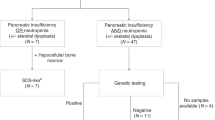Abstract
Diamond–Blackfan anemia is an autosomal dominant syndrome, characterized by anemia and a predisposition for malignancies. Ribosomal proteins are responsible for this syndrome, and the incidence of colorectal cancer in patients with this syndrome is higher than the general population. This patient’s Diamond–Blackfan anemia was caused by a novel ribosomal protein S19 gene mutation, and he received chemotherapy for colorectal cancer caused by it. In his cancer, ribosomal proteins S19 and TP53 were overexpressed. He received 5FU and cetuximab; however, his anemia made chemotherapy difficult, and he did not survive long. Patients with Diamond–Blackfan anemia should be screened earlier and more often for colorectal cancer than usual.



Similar content being viewed by others
Abbreviations
- CRC:
-
Colorectal cancer
- DBA:
-
Diamond–Blackfan anemia
- O/E ratio:
-
Observed/expected ratio
- RPS19:
-
Ribosomal protein S19
- CT:
-
Computed tomography
- PS:
-
Performance status
- Cmab:
-
Cetuximab
- FL:
-
5-Fluorouracil and calcium levofolinate hydrate
- PFS:
-
Progression-free survival
- RPL:
-
Ribosomal protein L
- D130fs:
-
Aspartic acid at codon 130 with subsequent frame-shifting
References
Vlachos A, Blanc L, Lipton JM. Diamond Blackfan anemia: a model for the translational approach to understanding human disease. Expert Rev Hematol. 2014;7:359–72.
Draptchinskaia N, Gustavsson P, Andersson B, et al. The gene encoding ribosomal protein S19 is mutated in Diamond-Blackfan anaemia. Nat Genet. 1999;21:169–75.
Choesmel V, Bacqueville D, Rouquette J, et al. Impaired ribosome biogenesis in Diamond–Blackfan anemia. Blood. 2007;109:1275–83.
McGowan KA, Li JZ, Park CY, et al. Ribosomal mutations cause p53-mediated dark skin and pleiotropic effects. Nat Genet. 2008;40:963–70.
Juli G, Gismondi A, Monteleone V, et al. Depletion of ribosomal protein S19 causes a reduction of rRNA synthesis. Sci Rep. 2016;6:35026.
Kondoh N, Schweinfest CW, Henderson KW, et al. Differential expression of S19 ribosomal protein, laminin-binding protein, and human lymphocyte antigen class I messenger RNAs associated with colon carcinoma progression and differentiation. Cancer Res. 1992;52:791–6.
Vlachos A, Rosenberg PS, Atsidaftos E, et al. Increased risk of colon cancer and osteogenic sarcoma in Diamond–Blackfan anemia. Blood. 2018;132:2205–8.
Chiabrando D, Tolosano E. Diamond Blackfan Anemia at the crossroad between ribosome biogenesis and heme metabolism. Adv Hematol. 2010;2010:790632.
Campagnoli MF, Ramenghi U, Armiraglio M, et al. RPS19 mutations in patients with Diamond–Blackfan anemia. Hum Mutat. 2008;29:911–20.
Gregory LA, Aguissa-Touré AH, Pinaud N, et al. Molecular basis of Diamond–Blackfan anemia: structure and function analysis of RPS19. Nucleic Acids Res. 2007;35:5913–21.
Matsson H, Davey EJ, Fröjmark AS, et al. Erythropoiesis in the Rps19 disrupted mouse: analysis of erythropoietin response and biochemical markers for Diamond–Blackfan anemia. Blood Cells Mol Dis. 2006;36:259–64.
Danilova N, Sakamoto KM, Lin S. Ribosomal protein S19 deficiency in zebrafish leads to developmental abnormalities and defective erythropoiesis through activation of p53 protein family. Blood. 2008;112:5228–377.
Lai MD, Xu J. Ribosomal proteins and colorectal cancer. Curr Genomics. 2007;8:43–9.
Fumagalli S, Cara A-D, Neb-Gulati A, et al. Absence of nucleolar disruption after impairment of 40S ribosome biogenesis reveals an rpL11-translation-dependent mechanism of p53 induction. Nat Cell Biol. 2009;11:501–8.
Munro AJ, Lain S, Lane DP. P53 abnormalities and outcomes in colorectal cancer: a systematic review. Br J Cancer. 2005;92:434–44.
Qin S, Li J, Wang L, et al. Efficacy and tolerability of first-line cetuximab plus leucovorin, fluorouracil, and oxaliplatin (FOLFOX-4) versus folfox-4 in patients with RAS wild-type metastatic colorectal cancer: The open-label, randomized, phase III TAILOR trial. J Clin Oncol. 2018;36:3031–9.
Mege D, Manceau G, Beyer L, et al. Right-sided vs. left-sided obstructing colonic cancer: results of a multicenter study of the French Surgical Association in 2325 patients and literature review. Int J Colorectal Dis. 2019;34:1021–32.
Acknowledgements
We thank Enago for their English editing.
Author information
Authors and Affiliations
Corresponding author
Ethics declarations
Conflict of interest
Kazuya Kimura, Kazuhiro Shimazu, Tsutomu Toki, Momoko Misawa, Koji Fukuda, Taichi Yoshida, Daiki Taguchi, Sho Fukuda, Katunori Iijima, Naoto Takahashi, Etsuro Ito, Hiroshi Nanjyo and Hiroyuki Shibata declare that they have no conflict of interest.
Human rights
Genetic examination of Diamond–Blackfan anemia was approved by the ethical committees of Akita University (#2126) and Hirosaki University (#2018–101).
Informed consent
Informed consent was obtained from the patient.
Additional information
Publisher's Note
Springer Nature remains neutral with regard to jurisdictional claims in published maps and institutional affiliations.
Kazuya Kimura and Kazuhiro Shimazu equally contribute this work
Rights and permissions
About this article
Cite this article
Kimura, K., Shimazu, K., Toki, T. et al. Outcome of colorectal cancer in Diamond–Blackfan syndrome with a ribosomal protein S19 mutation. Clin J Gastroenterol 13, 1173–1177 (2020). https://doi.org/10.1007/s12328-020-01176-7
Received:
Accepted:
Published:
Issue Date:
DOI: https://doi.org/10.1007/s12328-020-01176-7




